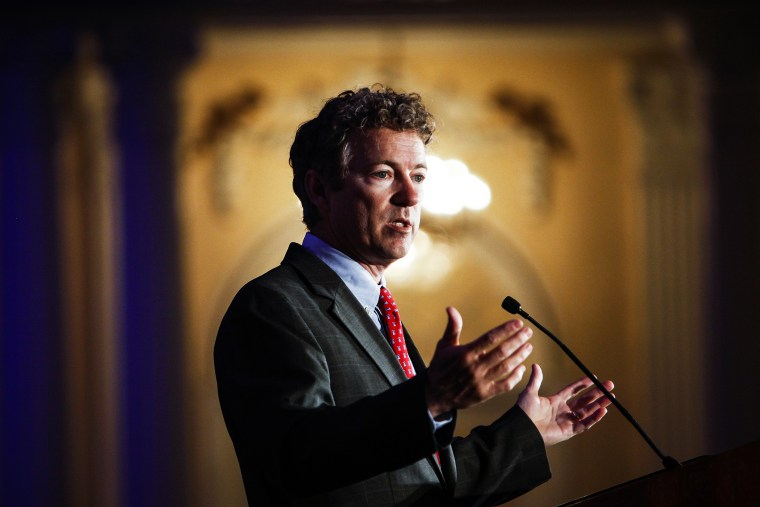In the immediate aftermath of the terrorist violence in Paris, Sen. Rand Paul (R-Ky.) saw an opportunity to make a political point: maybe it's time, the Republican senator argued, for France to rethink its immigration policies.
As a rule, libertarian-minded officials don't believe in immigration crackdowns, but Paul has Republican presidential primary voters to consider, and this apparently seemed like the right call.
Around the same time, however, former Rep. Ron Paul (R-Texas) had an entirely different concern. The senator's father, known for his deeply strange beliefs, was questioning whether the attack at Charlie Hebdo's offices was a false-flag operation. Ron Paul didn't specifically argue that it was a false-flag, but he considered it a legitimate question, adding that he's "determined to try to get truth out" about the terrorist acts.
Yesterday, the Washington Post reported on a similar set of circumstances in which Rand Paul made one pitch while his father made another.
Rand Paul wants to lead the United States. On Saturday in Texas, his father was speaking at a conference about how to leave it. "A lot of times people think secession, they paint it as an absolute negative," said former representative Ron Paul (R-Tex.). After all, Paul said, the American Revolution was a kind of secession. "You mean we should have been obedient to the king forever? So it's all in the way you look at it."
The senator was in California, trying to curry favor with the Koch brothers and his allies, while the former congressman was in Texas, delivering a speech at "a one-day seminar in breaking away from the central state."
Of course he was.
Walter Block, an economics professor at Loyola University and a Paul backer, told the Post, "If I were Ron, and my son were running for president, and we were in the same situation, I would shut up." Block added, "Ron is a millstone around Rand's neck, in the sense that he's not helping him -- or, at least, he's not helping him be Rand."
At first blush, the usual rules should apply: it's simply not fair to hold candidates responsible for the views of their family members. I know I wouldn't want to be blamed for some of what my relatives say, so my general inclination is to argue that a politician's kin should be off limits.
But with Rand and Ron it's not quite so simple. Much of Rand Paul's political life was spent urging people to put his father in the White House, making public appearances to espouse his father's bizarre ideas, and often speaking on his father's behalf as a surrogate.
In this sense, Ron Paul isn't just Rand Paul's father; he's his son's political mentor. Their familial relationship isn't even what's important in this dynamic -- any political figure who worked with a fringe presidential candidate who espoused ridiculous views should expect some scrutiny.
One assumes the senator will argue that he shouldn't be blamed for his father's off-the-wall ideas, and that defense might even be compelling under normal circumstances. But given that Rand Paul had a leading role in Ron Paul's operation, this isn't quite so easy.
